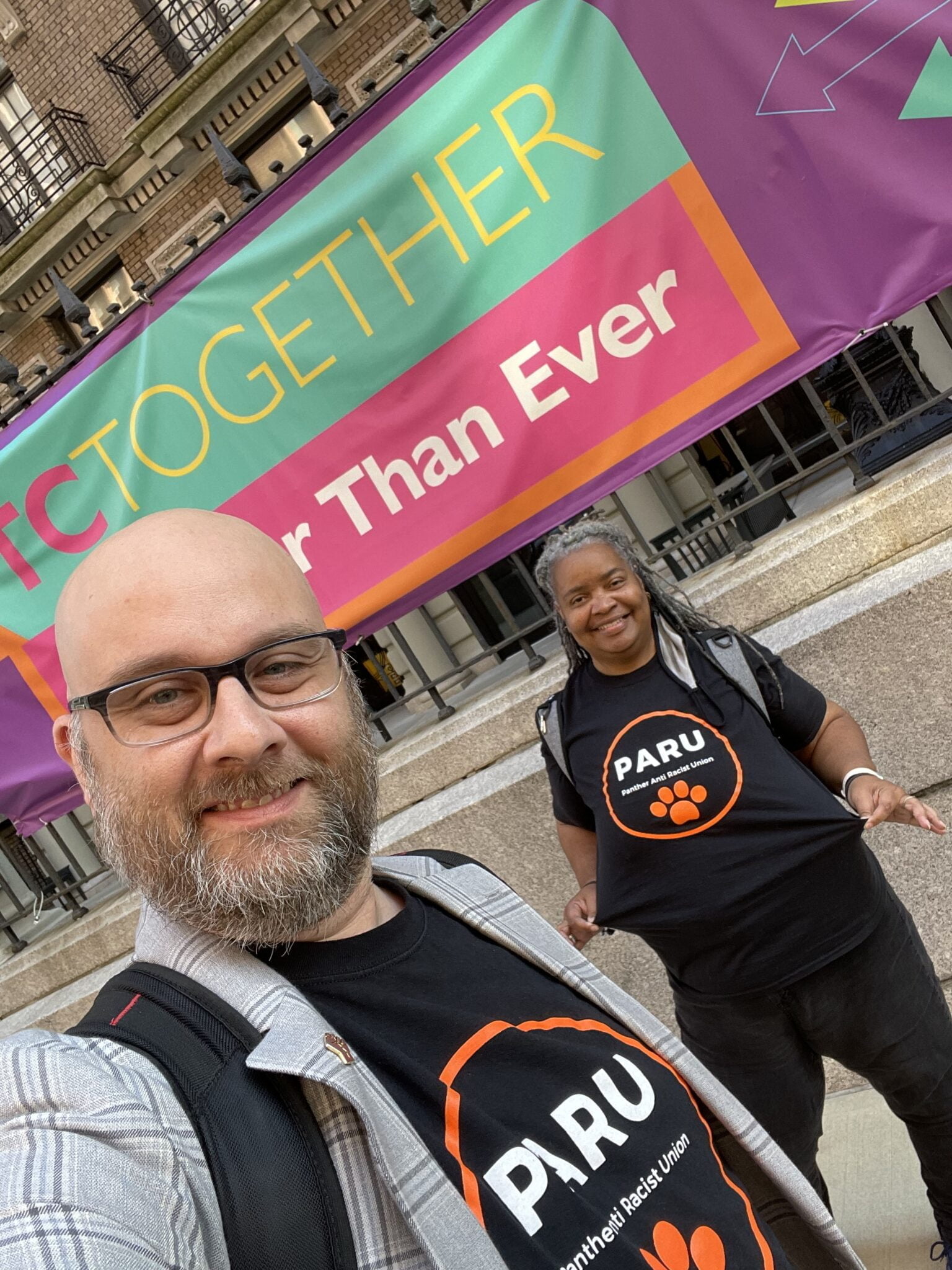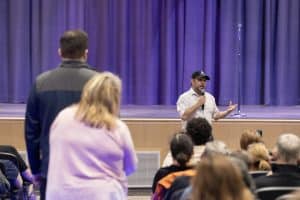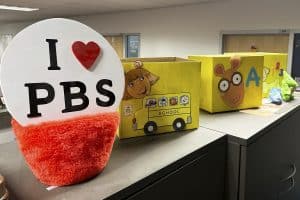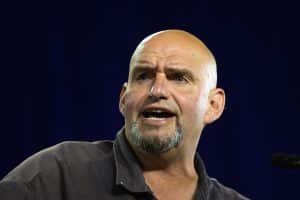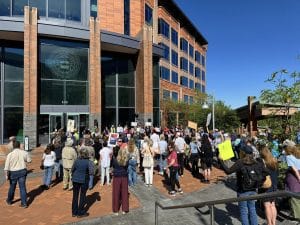In the summer of 2020, Central York School District’s diversity committee put together a list of books and educational resources for teachers and students to use as the local community, like the rest of the nation, struggled to make sense of the murder of George Floyd and the deep racial and social strife that ensued. However, the district’s all-white, right-wing school board apparently didn’t think resources like a “Sesame Street” town hall on racism and books such as “Who is Rosa Parks?” and “The Hate U Give” were appropriate. They banned the entire list.
Not so fast, said community members like Central York High School’s Ben Hodge, a performing arts teacher, and Patricia Jackson, an English teacher. They spoke with me about their successful organizing campaign to overturn this ban, and why it is important for teachers to stand up and speak out.
Cyril Mychalejko: In 2020 teachers at Central York put together a resource list to help other teachers and students teach, learn and have conversations about race and racism. Almost immediately afterwards, the school board voted to ban the list. Why do you think they took that action?
Ben Hodge: I’m fairly confident that they took that action because they were afraid and they were concerned because of what the conversations might have led to in terms of new knowledge, about the truth, about the real truth, about what’s going on in our country and our society. And it was out of fear and it was out of control. I think it was about keeping people from learning and discovering the truth. And I’m pretty confident that I can say that because they mentioned on public record many times that that was one of the reasons they shared their concern. And I believe they also said because they think there needs to be two sides, all sides need to be shared. But neglecting the fact that that’s what we were trying to do with this, that’s what these resources were actually trying to do, was present the side that has not been heard and seen.
Patricia Jackson: My answer is fear and ignorance and of not wanting to be treated like Black people. Because you know how Black people have been treated in the past, and you don’t want that ugly past to come back. But the only way to make sure history does not repeat itself is to teach it all of it in the good, the bad, and the ugly. And, you know, it just bewilders me that these folks would think that some of this history doesn’t make me uncomfortable. It makes me uncomfortable to know that there were black people that were hung just because their crops were better than their neighbors. And that needs to be taught because our children need to understand that so that it never happens again. So it was fear, it was ignorance. It was I’m not going to go do any research for myself. I’m just going to accept what the world tells me on Facebook, because it must be true.
Cyril: What was the initial reaction of teachers and students? And then.
Ben: I know when I heard those board meetings in those comments that I can’t say I was surprised. I was frustrated. And I was disgusted about the direction and of what the comments were and how they were being shared. And with no follow up, with no trying to understand why those resources were being put together, even being told why those resources were being put together, they still refused to hear that and Listen. So I was very frustrated and I was also very angered by it, which is why later on as the summer progressed in 2020, we went out and started and led the two community protests in September and November of 2020 as a response to the narrative and to the words and the comments and the anti-diversity rhetoric that was coming out of it and how that was not in line with the standards and what we have historically stood for as a district. Our hashtag line for that, those first two rallies were, “This is not the Central I Know,” and it was community members and teachers who were going out and saying very simply that this is not what Central stands for. These board comments, Do we even have a race problem here? You know, all this stuff that was coming out, was not in line with the Diversity Programming at Central that was established in 2007.
Patricia: Well, to stick with your question: How did students react? The students who were in the know were upset and wanted to understand why. The other students who were not in the know didn’t question it because they didn’t know any better. The one thing that the teachers here do well is they circle the wagons and the babies don’t know what’s going on because you have a smiling teacher in front of you. But your back is bloody. Your back is cut up because you’re now fearful. And that’s what happened. Teachers became fearful, particularly those who had anything to do with an African-American or an LGBTQ writer, which was just awful. For myself: Bring it, because I knew what was coming. When that resource list came out, I warned those teachers that backlash is coming for you and you better be ready because it’s not going to be well received. And it wasn’t.
Cyril: How did the organizing response initially take shape?
Ben: It started out kind of quite simply. We had reached a point where the rhetoric and the conversations were so bad that certain board members at the time and the community members that were supporting them essentially forced out a diversity speaker, Dr. Monea Majeed from the local YWCA and everybody in the district was very excited at the high school to hear what she had to say, especially in the time we were in. And eventually that online workshop was canceled because Dr. Majeed was getting threats and she was afraid for her and her family’s life and safety. At the end of the school day, that was a half day, people started to reach out to me and they knew my history of working with the diversity program and I guess knew that I was interested and already frustrated with how this was going, and I had at least three teachers come in to my door say, Ben, we have to do something about this. And are you willing to be the lightning rod for this, and are you okay with this? And I said, well, I guess, yeah. I said, Absolutely it is okay. And it needs to be done. Somebody needs to do it. I think it starts with somebody who is either already a leader in your community or someone who you believe has that leadership quality and it went from there. I didn’t want the event to be about me. The event was about a community, it was about the Central community. And so I defined that community as it needed to include students, it needed to include parents, it needed to include community members who wanted to speak. So my job turned into organizing the flow of the event? Making sure we had speakers and people were willing to share. So coordinating with some other people and students who were willing to share their stories. And it became a celebration of sorts, as well as an opportunity for people to air their frustration with what the direction of the district was at that point. But it also took me collaborating with other friends and other people who had access to PA systems and inquiring with the district to setting aside a space to be able to gather. I had to ask for permission to get access to outside of the Educational Service Center, and that was the extent of the connection to the district in terms of they basically said, yes, you have a First Amendment right to stand outside of the Educational Service Center, as long as it was not on school time. And so it became about figuring out what those logistics were, and focusing in on bringing in multiple voices from the community. That was really, really important to this process: continuing to set and control the narrative, which ended up being: “this is not the Central I know” – diversity matters here, and Education is not indoctrination.
Cyril: Patricia, what strategies and tactics proved to be most effective?
Patricia: Keeping the children front and center because it really was their battle. And that’s something that I had learned, you know, from the civil rights movement, it was really the children who won the battle, not necessarily Dr. Martin Luther King and his entourage. The children won the day. No one listens to teachers. We’re just furniture, okay? We’re the canary in the corner of the room, the chirps every once in a while. And then you feed us. But it was important for them to control the narrative. And it was important to provide a foundation for the children to fall back on so that they could go and bump against this resistance and learn about it. And when they got tired or they got frightened or they got angry, they had a place to come home. And they had two “parents” who would explain to them, this is what this looks like, this is why this is happening, you know, and what would we do next? But what do you think you need to do next? You know, and, you know, you slap a Band-Aid on it, you know, wipe your tears, give them a hug and send them back out into the fray.
Cyril: Ben, what do you think the tipping point was that led the school board to finally reverse the ban?
Ben: I think I will quote one of the parents who spoke at the board meeting, I think it was the previous week before they reversed the ban and it was like a three hour meeting, and he said, “You got caught with your pants down.” And so I will say, they got caught, I think they did not like the exposure that they were getting. And it was now starting to affect the bottom line, so to speak. Not only in the district, but the PR was so bad that people started to think twice before coming to this area. Listen, when bestselling author Brad Meltzer calls in to one of your board meetings and literally calls in to it and calls you out for banning a children’s book about Rosa Parks and MLK Jr., you’ve definitely crossed the line and done some things that you’re going to have to eventually to make it go away, and should probably reverse course. It got to the point where the community overwhelmingly finally started to speak up and speak out and the voices now started to shift towards reversing the ban and condemning the decision. Back in 2020, if you go back and listen to those board meetings, it sounded like it was overwhelmingly like hundreds of people in the community were for these book bans and we shouldn’t be talking about this stuff in school. Through our protests and rallies, everyone else started to realize what was happening. The playbook hasn’t changed: groups like Moms for Liberty, No Left Turn in Education, and The Heritage Foundation were (and are) putting out cookie cutter letters for people to send to the board. And they all kind of sounded the same, and made it seem like a lot of people in the community were for this ban. but it actually was from the same 15 to 20 people. If that many. Some of them weren’t even from the District at all. And it was just drowning everything else out. So when you listen to the board meetings, the administration and board only heard that side and nobody else was providing the other side of that narrative and what the actual truth was. And so it got to a point where with the protesting from the students outside of the school, the media coverage that we were gaining from that and the exposure that ended up coming from that, it got to the point to where the community made a very distinct, clear choice on that last board meeting on the 20th last year where the finally voted to overturn the ban. They backed down, I think, because it became very clear that the voices of 2020 were not representing the actual full part of the community.
Cyril: And so we were there like hundreds of people within your campaign that would show up.
Ben: The last rally a year ago yesterday was the day they reversed the ban. We had over 250 people out there on that lawn outside the Educational Service Center with signs and orange and black for Central pride. We had students, former board members … We had union reps. We had kids. Alumni were coming back for this. I mean, teachers, it was 250 plus people who showed up and many more wanted to make it but couldn’t show up. And in the board meetings the citizen comments were now overwhelmingly in support of reversing the ban and shaming the district for their choices and decisions and expressing sadness about it. The many Alumni calling in was overwhelmingly powerful. There was even one Alumnus who sent their graduation diploma back to the district in protest of the actions. Very powerful.
Cyril: Patricia, how many teachers do you think were actively and visibly engaged in this movement? And were you personally ever afraid of losing your job, given your role?
Patricia: I would say there were about 10 to 12 teachers who stood with the children during their protests. But there was definite fear because a lot of these folks, this is the only job they’ve ever had and this is the job that they want to stay with. So they were afraid of losing their jobs. And yeah, I was afraid of losing my job. But you know what? I’m a good teacher. And I’m gonna make you work real hard to prove that I’m a bad teacher. Initially, there were these nuisance right to know requests that were filed against Ben. There were two, and I’m a union rep, so there were one or two other teachers who were also receiving these right to know requests. But when that didn’t pan out, when that didn’t work for these miscreants, they turned ugly. They started going to our Facebook pages and they started reporting us, reporting all of our posts to the HR director. And then we had to have investigations and that sort of thing. Personally, myself, I was cyber attacked. I had to change my router like every 2 to 3 days, the password. I couldn’t get into some of my bills because somebody was trying to hack into my bills. I would have to call in. It was awful, absolutely awful. They were prank calls to my 83-year-old mother. And that’s the one thing that will send me from 0 to 150. And the people who were doing this, they are insidious. I have been doxxed to a right wing magazine by name and I could not retaliate against this person because I have an agreement with the district to not mention this person’s name. And this person is someone who killed a cat and put the dead body in the mailbox of a former school board candidate. That’s how crazy these people are. So there’s a live in fear kind of thing, but I don’t think it’s a live in fear to live with your situational awareness because you want me to be the one. I’ll be the one today.
Cyril: What advice would you give to teachers, students and parents fighting efforts in Bucks County to ban books and censor classrooms?
Ben: I would say be an anchor first. So Patty and I have been talking about this and we’ve been getting this question a lot. And we’ve come we’ve settled in on this concept. And this metaphor: be an anchor in the storm that we find ourselves in. Hold fast and also find your other anchors. We like to say that this is my anchor. Patty is my anchor and I’m one of hers. Our students have become anchors to us. Be an anchor, be strong, hold fast, find your community, find your network, and use them for support and don’t give up. Because, as I said, to other places that we’ve talked to, I feel pretty strongly that we were losing that battle in our district. We were all the voices of reason and the voices of truth and justice and love and hope and peace. Those voices were getting lost and we were losing that battle because the other voices were showing up for chaos and disruption and hate and racism and prejudice and old tropes that were just getting recycled. That narrative has been winning and is winning in some areas. And so that’s why it was very important as anchors, to drop your anchor and hold on in this storm and say, enough is enough. This is where we’re planting our flag. And, you know, take it or leave it and let the people in power and in control figure out which side of history they’re going to choose.
Patty: And my message to the children is, your Constitutional rights don’t start when you turn 18. They start the moment you take a breath. Okay. And at 14, you have certain rights, privacy and First Amendment rights. And while you must be respectful to your parents, you need to understand that you have rights and you need to understand what those rights are. To the parents on the other side, you have the right to raise your child. You don’t have the right to raise anybody else’s child ever. You don’t have to read that book, but you can’t take that book from somebody else. And for the good parents, okay, you need to find your voice for yourself and for your children because they don’t listen to teachers and your teachers are under siege, and that’s why they’re teacher shortages and why people, good people are leaving the profession and good people aren’t even thinking about getting into the profession. So if you want public education to continue with what it is, you need to step up for your children and you need to step up for your teachers. There was one mom that came to one of the board meetings, and I’ll never forget how tired she sounded, and she talked about how tired she was and how she elected the school board officials to take care of her children. And when she learned on CNN what they were doing, that she realized that they were not doing that. And she said, I’m not going to speak to you. I’m going to speak to you at the polls when I go to vote. And that was powerful. And as for the teachers, stick your neck out. Stick your neck out. Stand up for your kids and stand up for what is right. Be a model. That’s what teachers are all about. Being a role model for your children … You need to be that one person that reared 12 or whomever, a number of people in the building. The children come to you when they’re troubled, that other people come to you when they’re trouble, that administrators come to, when they’re troubled, that central administration comes to, when they have an idea that they want to bounce off of you. And the most important thing is: The anchor. It takes the team. It cannot be just a teacher speaking out because they’re not going to listen to you any way. And it cannot just be the children because are going to shout you down like they did over in Long Island. Shout the children down because they’re just kids. What do they know? It has to be children leading the way and adults in the background making sure that they’re safe and that their voices are heard.
Ben: I believe that’s so powerful because when that leadership starts to happen and the kids get out there and share their story or a protest starts, and you just sit there and you’re consistent with that and you’re finding ways to not be disruptive to the school day. Don’t give your administration, your district or anybody in your community a reason to point the finger at the protests and say, see, they’re missing school. See, they’re missing breakfast. See, they’re missing class time. They’re not getting their education. No, no, no, no. You do it in the morning. You do it after school. You do it in a place that’s noticeable and visible, but you do it in a way that isn’t going to give them any leg to stand on when they come for you, and they will. They won’t hear your message if you’re skipping classes or “disrupting” educational/work time. But when you’re handling all your business, going to class, doing your work as usual and you’re out there protesting at specific, non disruptive times, it sends a different message.
Cyril: Is there anything else that you want to add that we didn’t touch on?
Patricia: Don’t give up. This fight is so far from over. Don’t. We cannot give up. We are going to wake up in an America that we do not recognize. And as Brad Meltzer said, these people do not own patriotism. They do not own patriotism. They do not get to call themselves patriots and call you something else. We are patriots. I love my country. I stand for the Pledge of Allegiance. I stand for the anthem. But I stand for the rights of someone who chooses not to either. Because that’s what America is all about. It’s about choice. And as I go back to it, you may not want your child to read a certain book. That’s fine. You raise your child, have you want to raise your child, but you don’t get to raise the neighborhood down the street’s child. That’s not your business. Mind your business to stay in your lane.
You can contact Ben on Instagram @bhstudios @cy.paru and Twitter @benhodgestudios, and Patricia on Instagram @bybirthright and Twitter @treistan.
